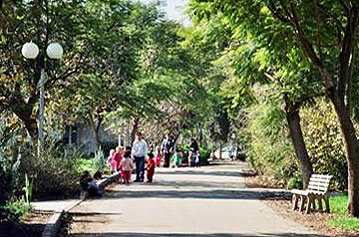Eric Lee, an American-born writer and website developer, lived at Kibbutz Ein Dor in the 1980s and ’90s, before moving to Britain in 1998. He is the founding editor of LabourStart, a website that reports globally on trade union activities and workers’ rights campaigns. In this piece from his blog, “The most equal society in the world,” Lee examines life on kibbutz when it was a model commune (excerpted below):
 |
| Kibbutz Ein Dor |
I lived in a place where everyone worked, but no one was paid for their work.
All the essentials of life were free — housing, health care, education, food, travel. Even daily newspapers, televisions and radios, even a kettle for making tea. …
Where I lived, people worked in all types of jobs … But it didn’t matter what you did, no one had more than anyone else.
When luxuries of different kinds became available, such as newer housing, or larger refrigerators, or colour televisions, they were allocated according to a system we all agreed was just — usually based on seniority.
The unpleasant but essential jobs were shared as well, so on weekends everyone had to be ready about once a month to do something different just to keep the place running. For example, every fourth Saturday, I milked cows, though my day job was to work as a computer programmer. …
We raised our children together, from birth, in children’s houses. They spent their days there and their nights too, coming home to visit their parents from 16:00 to around 20:00 every day. …
We ate together in a common dining room, and food like everything else was provided without money — everyone took what they needed. We had a shared laundry too, and our clothes were washed and mended for us without charge, every day of the week.
I’ve never forgotten a conversation I had with the man who was, at the time, the elected head of the factory. When I asked him about being a manager he corrected me and said he was just a “coordinator”; we didn’t believe in managers. His office was one of the only places in the factory that had air conditioning, so on hot summer days he’d leave the door open so that everyone could see he wasn’t using it.
It was not a perfect society, and over the years many of its values eroded and were eventually lost.
But equality was at its core.
. . . Another key value without which we’d have found this unbearable was democracy.
We voted on everything. We rotated managers (or “coordinators”) regularly, … We had weekly meetings of the entire community at which all important issues were settled. We had more than 50 committees which regulated every aspect of our common lives, …
These three blog posts of our own, also discuss what the kibbutz was and how it has evolved:
- “Changes on Kibbutz” reports on a talk by Gavri Bargil in 2008, a veteran kibbutz federation leader, who briefly and helpfully summarized the transformations that have taken place;
-
“Film documents kibbutzim evolving beyond utopia” from 2012, reflects on the lives of retired veteran kibbutzniks, including some personally known to us over the years;
-
“Kibbutz in Comeback—As Community, not Commune” is from May of this year, providing a contemporary look on ways in which many of today’s kibbutzim have recovered from dark times.






Leave A Comment